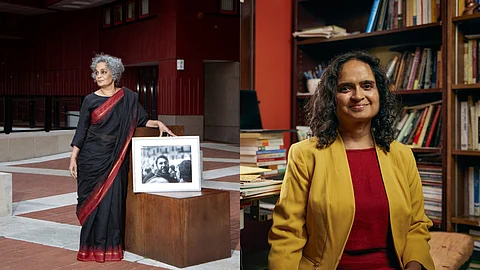
- HOMEGROWN WORLD
- #HGCREATORS
- #HGEXPLORE
- #HGVOICES
- #HGSHOP
- CAREERS
- ABOUT US
- CONTACT US

2024 was a truly watershed year for homegrown Indian literature — especially in the realms of Indian English literature and speculative fiction in the South Asian context.
In March this year, author Amitav Ghosh received the Erasmus Prize — awarded by the Praemium Erasmianum Foundation to individuals or institutions that have made exceptional contributions to culture, society, or social science in Europe and the rest of the world — for addressing the climate crisis through both his fiction and nonfiction works such as Gun Island and The Great Derangement. The award, named after the Dutch Renaissance humanist Desiderius Erasmus, placed him in the company of global intellectuals who use art and literature as instruments of social change.
In May, Bengaluru and Hyderabad-based author and game-designer Lavanya Lakshminarayan was shortlisted for the Arthur C. Clarke Award, one of the most prestigious awards in science fiction, for her debut novel 'Analog/Virtual: And Other Simulations of Your Future'. The only other Indian writer on the Award's prestigious history is Amitav Ghosh, who won it in 1997 for his novel 'The Calcutta Chromosome'. It was a tremendous high in a year marked by many highs for South Asian speculative fiction.
In October, author and activist Arundhati Roy was awarded the prestigious PEN Pinter Prize which she shared with Egyptian author and activist Alaa Abd el-Fattah, who remains arbitrarily detained in Egypt despite having completed his unjust five-year prison sentence. The PEN Pinter Prize — set up by English PEN in memory of Nobel laureate playwright Harold Pinter — is awarded to writers who defend freedom of expression, often at great risk to their own safety.
October was also a high-point for Indian academia as historian Shailaja Paik became the first Dalit scholar to be awarded the $800,000 McArthur 'Genius' Fellowship Grant for her works exploring the intersection of caste, gender, and sexuality in modern India through the lives of Dalit women.
In recognition and celebration of the great strides made by Indian authors this year, here are five books that marked this momentous year in the history of Indian literature:
Buy the book here.
Buy the book here.
Zeyad Masroor Khan's 'City on Fire' is a rare, visceral portrait of how everyday violence and hate become a part of our lives and consciousness; a society where name and clothes mark out a person as the 'other'. It is as much an incisive examination of religion and violence, imagined histories and fractured realities, grief and love in today's India, as it is an ode to the hope of continued unity, to an inclusive idea of India.
Buy the book here.
Amitav Ghosh's 'Smoke and Ashes' is at once a travelogue, a memoir, and an essay in history, drawing on decades of archival research. Ghosh traced the transformative effect the opium trade had on Britain, India, and China, as well as the world at large and found that opium was central to the origins of some of the world’s biggest corporations, of America’s most powerful families and prestigious institutions (from the Astors and Coolidges to the Ivy League), and of contemporary globalism itself.
Buy the book here.
Fables, dreams, and myths come together Tashan Mehta's masterful fantasy, 'Mad Sisters of Esi'. The circuitous, labyrinthine novel sweeps across three landscapes, and features a museum of collective memory and a festival of madness. At its core, it asks: In the devastating chaos of this world, where all is in flux and the truth ever-changing, what will you choose to hold on to?
A novel of great conviction and imagination that encompasses and moves across vast swathes of space and time, Mad Sisters of Esi won Mehta the Best Author (Fiction) award at the 2024 AutHer Awards.
Buy the book here.
If you enjoyed reading this, here's more from Homegrown:
40 Years After The Bhopal Gas Tragedy, A Homegrown Zine Continues The Fight For Justice
A New Homegrown Book Weaves Tales Of India's Cultures & Communities Through Its Trees
5 Distinctly Homegrown Fantasy Novels That Take The Genre To All-New Heights
